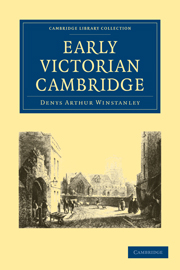Book contents
- Frontmatter
- Contents
- Preface
- Chapter I THE FOUNDATION OF DOWNING COLLEGE
- Chapter II A COLLEGE ELECTION
- Chapter III UNDERGRADUATES IN BONDS
- Chapter IV THE ATTACK ON HEADS OF HOUSES
- Chapter V CHRISTOPHER WORDSWORTH
- Chapter VI THE RELIGIOUS TESTS
- Chapter VII CHANCELLORS AND HIGH STEWARDS
- Chapter VIII TOWN AND GOWN
- Chapter IX TROUBLE AT THE FITZ WILLIAM
- Chapter X INTERNAL REFORM
- Chapter XI THE ROYAL COMMISSION
- Chapter XII BETWEEN THE TWO COMMISSIONS
- Chapter XIII STATUTE XLI AND THE THREE REGIUS PROFESSORSHIPS
- Chapter XIV THE STATUTORY COMMISSION AND THE UNIVERSITY
- Chapter XV THE STATUTORY COMMISSIONERS AND TRINITY COLLEGE
- Chapter XVI CAMBRIDGE AS IT WAS
- Appendices
- Index
Chapter VI - THE RELIGIOUS TESTS
Published online by Cambridge University Press: 07 September 2010
- Frontmatter
- Contents
- Preface
- Chapter I THE FOUNDATION OF DOWNING COLLEGE
- Chapter II A COLLEGE ELECTION
- Chapter III UNDERGRADUATES IN BONDS
- Chapter IV THE ATTACK ON HEADS OF HOUSES
- Chapter V CHRISTOPHER WORDSWORTH
- Chapter VI THE RELIGIOUS TESTS
- Chapter VII CHANCELLORS AND HIGH STEWARDS
- Chapter VIII TOWN AND GOWN
- Chapter IX TROUBLE AT THE FITZ WILLIAM
- Chapter X INTERNAL REFORM
- Chapter XI THE ROYAL COMMISSION
- Chapter XII BETWEEN THE TWO COMMISSIONS
- Chapter XIII STATUTE XLI AND THE THREE REGIUS PROFESSORSHIPS
- Chapter XIV THE STATUTORY COMMISSION AND THE UNIVERSITY
- Chapter XV THE STATUTORY COMMISSIONERS AND TRINITY COLLEGE
- Chapter XVI CAMBRIDGE AS IT WAS
- Appendices
- Index
Summary
Less than a hundred years ago the University of Cambridge was practically a preserve of the Church of England. The colleges were, indeed, able to admit the adherents of any creed or of none, as no profession of faith was exacted at matriculation; but they seem to have made a very sparing use of this liberty, and not to have been very willing to exempt students who did not belong to the English Church from attendance at chapel. Consequently there were very few undergraduates who were not at least nominal Anglicans; and even if a more generous policy had been pursued, it is unlikely that there would have been many more, as the law of the University required the recipients of all degrees either to declare themselves members of the Established Church or to subscribe the three articles of the Canons of 1604, which asserted that the Sovereign was the supreme Governor of the Church, that no foreign prince or prelate had any ecclesiastical or spiritual jurisdiction and authority within the realm, and that the Prayer Book and thirty-nine articles were in accordance with the Word of God. Moreover, by the law of the land candidates for degrees were required to take the oath of supremacy; and by the Act of Uniformity, passed in the reign of Charles II, Heads of Houses, Fellows, Tutors, Professors and Readers were obliged to conform to the liturgy of the Church of England.
- Type
- Chapter
- Information
- Early Victorian Cambridge , pp. 83 - 96Publisher: Cambridge University PressPrint publication year: 2009First published in: 1940

